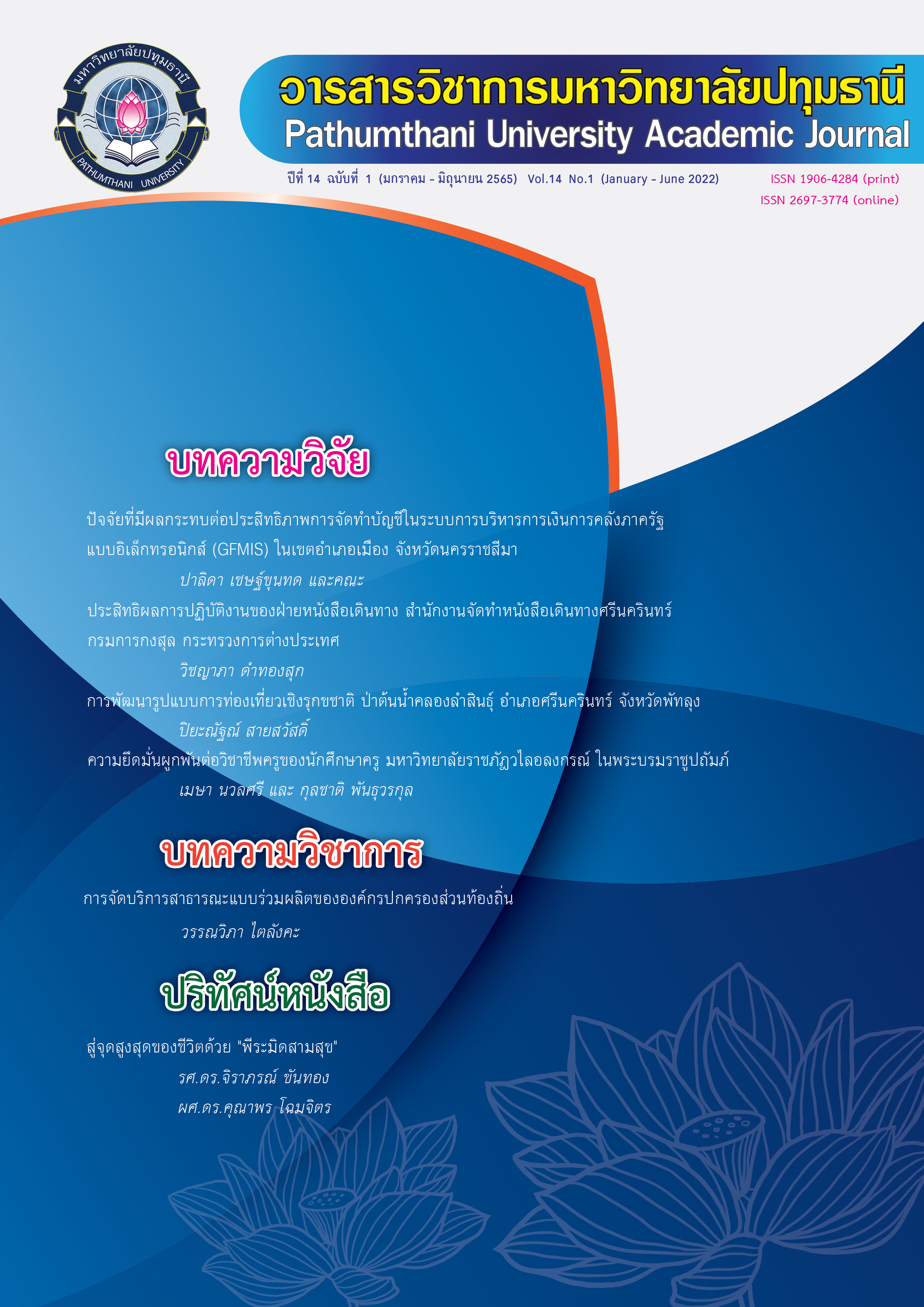ONLINE LEARNING IN OCCUPATIONAL HEALTH AND SAFETY COURSE DURING THE COVID-19 PANDEMIC, FACULTY OF ALLIED HEALTH SCIENCES, NORTHERN COLLEGE, TAK PROVINCE
Keywords:
Online Learning , Online Learning Behavior , Classroom Action ResearchAbstract
The purposes of this classroom action research were to study the opinions and behaviors of students on online learning during the COVID-19 Pandemic and evaluate to lecturer quality in occupational health and safety course, semester 1/2564. The target population refers to 34 students of the Faculty of Allied Health Sciences, Northern College, they were study in occupational health and safety course, semester 1/2564 (During June - October 2021). The research instrument was online questionnaire. The content validity was checked by 3 experts, The Index of Item-Objective Congruence: IOC ≥ .67. The reliability was conducted using Cronbach’s alpha coefficient at .86. The parameters used to data analysis were frequency, percentage, mean and standard deviation.
The results found that the majority of the students used their smartphones for online learning (67.60%) and for took the exam (55.90%). The students' opinions on the online learning were at very good level. The most consistent online learning behavior of students (67.60%) were completing the online exercises in time. The lecturer was evaluated by students at a very good level. The benefit of online learning program is that students can review the content of the course. However, the problem with the online learning process was the unstable internet signal that effect on students using online multimedia.
References
เครือข่ายมหาวิทยาลัยราชภัฏ 38 แห่ง. (2564). การเรียนการสอนออนไลน์ช่วงสถานการณ์แพร่ระบาดของ COVID-19 สำรวจระหว่างวันที่ 24-29 มกราคม 2564. [ออนไลน์]. เข้าถึงได้ จาก :https://register.kpru.ac.th/RajabhatPoll/contents/20200007/rajabhatPoll.pdf
เจริญ ภูวิจิตร. (2564). การจัดการเรียนรู้ทางออนไลน์อย่างมีประสิทธิภาพในยุคดิจิทัล. สถาบันพัฒนาครู คณาจารย์และบุคลากรทางการศึกษา. [ออนไลน์]. เข้าถึงได้จาก : http://www.nidtep.go.th/2017/publish/doc/20210827.pdf
ธัญธัช วิภัติภูมิประเทศ. (2559). “พฤติกรรมการใช้สมาร์ทโฟนในชั้นเรียนของนักศึกษามหาวิทยาลัยธุรกิจบัณฑิตย์.” สุทธิปริทัศน์. ปีที่ 30 ฉบับที่ 95 (กรกฎาคม-กันยายน). หน้า 48-58.
สำนักงานคณะกรรมการกฤษฎีกา. (2564). “คำสั่งศูนย์บริหารสถานการณ์การแพร่ระบาดของโรคติดเชื้อไว้รัสโคโรนา 2019 (โควิด 19) ที่ 21/2564 เรื่อง พื้นที่สถานการณ์ที่กำหนดเป็นพื้นที่ควบคุมสูงสุดและเข้มงวด พื้นที่ควบคุมสูงสุด พื้นที่ควบคุม และพื้นที่เฝ้าระวังสูง ตามข้อกำหนดออกความในมาตรา 9 แห่งพระราชกำหนดการบริหารราชการในสถานการณ์ฉุกเฉิน พ.ศ.2548”. ราชกิจจานุเบกษา เล่ม 138 ตอนพิเศษ 297 ง. วันที่ 13 พฤศจิกายน. [ออนไลน์]. เข้าถึงได้จาก: http://www.ratchakitcha.soc.go.th/DATA/PDF/2564/E/154/T_0001.PDF
สำนักงานคณะกรรมการการอุดมศึกษา. (2557). คู่มือการประเมินคุณภาพการศึกษาภายในระดับ อุดมศึกษา พ.ศ.2557. นนทบุรี : ห้างหุ้นส่วนจำกัด ภาพพิมพ์.
สุเวช พิมน้ำเย็น และ นัฐพล จำปาเทศ. (2564). “การเรียนรู้ออนไลน์วิชาอาชีวอนามัยและความปลอดภัย ช่วงสถานการณ์แพร่ระบาด COVID-19 คณะสาธารณสุขศาสตร์ วิทยาลัยนอร์ทเทิร์น”. วารสารสืบเนื่องจากการประชุมวิชาการระดับชาติ นอร์ทเทิร์นวิจัย ครั้งที่ 7 ประจำปีการศึกษา 2563. วิทยาลัยนอร์ทเทิร์น. หน้า 1716–1722.
Downloads
Published
How to Cite
Issue
Section
License
Copyright (c) 2022 Suwech Pimnumyen

This work is licensed under a Creative Commons Attribution-NonCommercial-NoDerivatives 4.0 International License.
บทความที่ได้รับการตีพิมพ์เป็นลิขสิทธิ์ของวารสารมหาวิทยาลัยปทุมธานี
ข้อความที่ปรากฎในบทความแต่ละเรื่อง เป็นความคิดเห็นส่วนตัวของผู้เขียน กองบรรณาธิการไม่จำเป็นต้องเห็นด้วยเสมอไป และไม่มีส่วนรับผิดชอบใด ๆ ถือเป็นความรับผิดชอบของผู้เขียนแต่เพียงผู้เดียว



